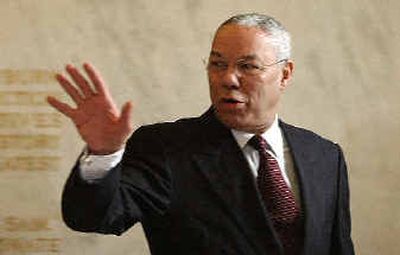Powell pushes Sudan on militias

UNITED NATIONS – Secretary of State Colin Powell said Sudan must act quickly to disarm Arab militias in its western Darfur region or face possible U.N. sanctions, while the U.S. Congress declared that the killings of tens of thousands of black civilians by Arab militias there amount to “genocide.”
Both the House and Senate measures passed unanimously Thursday night urged President Bush, likewise, to call the situation in Sudan “by its rightful name – genocide” and urged his administration to work with the international community to stop it.
A 1948 U.N. convention obligates the international community to prevent and punish acts it has declared as genocide.
Powell met with U.N. Secretary-General Kofi Annan on Thursday for the second time in three weeks to discuss what he called a “humanitarian catastrophe” in Darfur, where pro-government Janjaweed militias have been accused of killing up to 30,000 civilians, most of them black villagers, and forcing more than 1 million to flee their homes in the 15-month conflict.
U.S. officials and humanitarian groups accuse the Sudanese government of backing the militias – a claim Khartoum denies.
Earlier Thursday, Sudanese Foreign Minister Mustafa Osman Ismail accused the United States and Britain of meddling in the crisis, saying their increased pressure was the same tactic they used against Iraq. He warned against any international intervention and told a news conference in Paris that threatening Sudan with sanctions would only complicate matters.
Annan and Powell dismissed the accusations.
“One person’s meddling is another person’s attempt to save people who are in desperate trouble,” Powell retorted.
Prime Minister Tony Blair said Thursday Britain had a “moral responsibility” to act. Asked about possible military intervention, Blair told his monthly news conference: “We rule nothing out, but we are not at that stage yet.”
Powell rejected suggestions of military action.
“This is a very large area. There is not a simple military solution that is at hand,” he said. “This is a matter for the Sudanese government to handle.”
The United States circulated a revised draft Security Council resolution Thursday that for the first time directly threatens sanctions against the Sudanese government.
The new draft sets a timetable for assessing progress on apprehending and bringing to justice the Janjaweed and calls on Annan to report every 30 days “and expresses its intention to consider further actions, including the imposition of sanctions on the government of Sudan, in the event of noncompliance.”
The fighting began when two groups drawn from Darfur’s African tribes took up arms over what they regard as unjust treatment by the government in their struggle with Arab countrymen over land and resources. The Janjaweed began attacking the black Africans, and some human rights groups have accused the militias of ethnic cleansing and genocide.